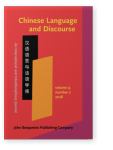“I am not criticizing you”
A constructionist analysis of an indirect speech act
This study examines a Chinese indirect speech act conventionally expressed with what I call the construction of earnest
advice. From a constructionist perspective, I posit that the construction of earnest advice is an indirect
speech act construction. Its idiosyncratic form is paired with the function of showing genuine concern and providing advice in the
best interest of the hearer. Based on corpus evidence and discourse analysis, I analyze the contextually situated subtypes of this
function, including passing judgments, providing suggestions, issuing complaints and mock sarcasms. The use of the contextual
subtypes depends on interpersonal factors such as social distance, power difference, and group membership. This study has
implications for politeness theories.
Article outline
- 1.Introduction
- 2.Data and methodology
- 3.Constructionhood of [Búshi wǒ shuō nǐ, X]
- 3.1Formal idiosyncrasy
- 3.2Semantic non-predictability
- 3.3Frequency of use
- 4.Pragmatic functions
- 5.Contextual realizations of earnest advice
- 5.1Judgment
- 5.2Complaint
- 5.3Suggestion
- 5.4Mock sarcasm
- 6.Conclusion
- Note
-
References
References
Arce, Wilfredo F.
1970 “
The Family as a Social Group: An Outline for Inquiry.”
Philippine Sociological Review 18 (2): 87–91.

Bach, Kent, and Robert M. Harnish
1979 Linguistic Communication and Speech Acts. Cambridge, Mass.: MIT Press.

Blakemore, Diane
2002 Relevance and Linguistic Meaning: The Semantics and Pragmatics of Discourse Markers. Cambridge; New York: Cambridge University Press.


Bogardus, Emory S.
1925 “
Measuring Social Distance.”
Journal of Applied Sociology 91: 299–308.

Boxer, Diana
1993 “
Social Distance and Speech Behavior: The Case of Indirect Complaints.”
Journal of Pragmatics 19 (2): 103–25.

.

Brown, Penelope, and Stephen C. Levinson
1978 “
Universals in Language Usage: Politeness Phenomena.” In
Questions and Politeness, ed. by
Esther N. Goody, 56–289. Cambridge: Cambridge University Press.

Brown, Penelope, and Stephen C. Levinson
1987 Politeness: Some Universals in Language Usage. Cambridge; New York: Cambridge University Press.


Chao, Yuen Ren
1968 A Grammar of Spoken Chinese. Berkeley and Los Angeles: University of California Press.

Chu, Zexiang
2003 “
‘老/小 姓+称谓性指人名词’格式的使用情况考察 [The study of ‘lǎo/xiǎo (老/小) + surname + noun’].”
Yuyan Wenzi Yingyong [
Applied Linguistics] 31: 29–33.

Clark, Herbert H., and Dale H. Schunk
1980 “
Polite Responses to Polite Requests.”
Cognition: International Journal of Cognitive Psychology 81: 111–43.


Dijk, Teun A. van
2008 Discourse and Power. Houndmills, Basingstoke, Hampshire; New York: Palgrave Macmillan.


Fraser, Bruce
1999 “
What Are Discourse Markers?” Journal of Pragmatics 31 (7): 931–52.

.

Goldberg, Adele E.
1995 Constructions: A Construction Grammar Approach to Argument Structure. Chicago: University of Chicago Press.

Goldberg, Adele E.
2006 Constructions at Work the Nature of Generalization in Language. Oxford: Oxford University Press.

Gu, Yueguo
1990 “
Politeness Phenomena in Modern Chinese.”
Journal of Pragmatics 14 (2): 237–257.


Hao, Lin
2009 “
语用标记语‘不是我说你’ [The discourse marker ‘Búshi wǒ shuō
nǐ’].”
Hanyu Xuexi [
Chinese Language
Learning], 61: 39–44.

Hilpert, Martin
2014 Construction Grammar and Its Application to English. Edinburgh: Edinburgh University Press.

Ho, David Yau-Fai, and Chi-Yue Chiu
1994 “
Component Ideas of Individualism, Collectivism, and Social Organization: An Application in the Study of Chinese Culture.” In
Individualism and Collectivism: Theory, Method, and Applications, ed. by
Ŭi-ch’ŏl Kim,
C. Kagitcibasi,
Harry C. Triandis,
S -C. Choi, and
G. Yoon, 137–56. Thousand Oaks, Calif.: Sage Publications.

Jing-Schmidt, Zhuo
2017 “
What Are They Good for? A Constructionist Account of Counterfactuals in Ordinary Chinese.”
Journal of Pragmatics 1131: 30–52.

.

Lü, Shuxiang
1999 现代汉语八百词 [
Eight Hundred Words of Modern Chinese]. Beijing: Commercial Press.

Morgan, Jerry L.
1978 “
Two Types of Convention in Indirect Speech Acts.” In
Pragmatics, ed. by
P. Cole, 261–80. New York: Academic Press.


Panther, Klaus-Uwe, and Linda Thornburg
1998 “
A Cognitive Approach to Inferencing in Conversation.”
Journal of Pragmatics 30 (6): 755–769.


Schiffrin, Deborah
1987 Discourse Markers. Cambridge; New York: Cambridge University Press.


Searle, John R.
1975 “
Indirect Speech Acts.”
Syntax and Semantics 31: 59–82.

Spencer-Oatey, Helen
2005 “
(Im)Politeness, Face and Perceptions of Rapport: Unpackaging Their Bases and Interrelationships.”
Journal of Politeness Research: Language, Behavior, Culture 1 (1): 95–119.


Tang, Xuening, and Zhang, Jinquan
2016 “
元语否定与‘不是我说你’类话语标记的产生机制 [Metalinguistic negation and mechanism of discourse marker ‘Búshi wǒ shuō nǐ’].”
Dangdai Xiucixue [
Contemporary Rhetoric] 197 (5): 89–95.

Thornburg, Linda, and Klaus Panther
1997 “
Speech Act Metonymies.” In
Discourse and Perspective in Cognitive Linguistics, ed. by
W. A. Liebert,
G. Redeker, and
L. Waugh, 205–19. Amsterdam and Philadelphia: John Benjamins.


Triandis, Harry Charalambos
1995 Individualism & Collectivism. Boulder: Westview Press.

Yue, Yao
2011 “
从‘不是我说你’类话语标记的形成看会话中主观性范畴与语用原则的互动 [The interaction between subjectivity and pragmatic principles in Chinese conversation viewed from the formation of discourse marker: A case study on the phrase ‘Búshi wǒ shuō nǐ’].”
Shijie Hanyu Jiaoxue [
Chinese Teaching in the World] 25 (1): 69–77.

Zhang, Jijia, and Chen, Jun
2007 “
汉语称呼语概念结构的研究 [The study of conceptual structures of Chinese address words].”
Yuyan Wenzi Yingyong [
Applied Linguistics] 21: 41–49.

Cited by
Cited by 1 other publications
Wang, Huijing, Heidi Hui Shi & Zhuo Jing-Schmidt
2021.
Affective stance in constructional idioms: A usage-based constructionist approach to Mandarin [yòu X yòu Y].
Journal of Pragmatics 177
► pp. 29 ff.

This list is based on CrossRef data as of 27 march 2024. Please note that it may not be complete. Sources presented here have been supplied by the respective publishers.
Any errors therein should be reported to them.
